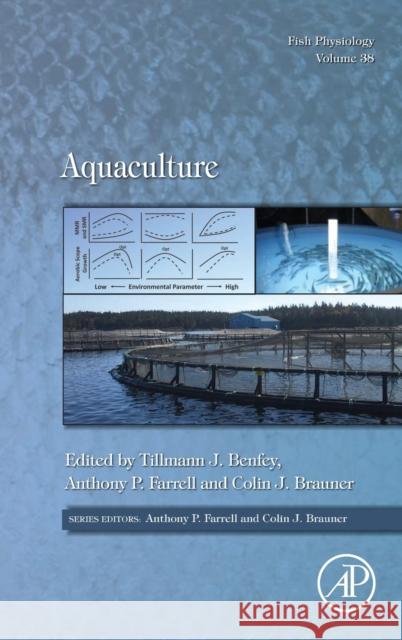Aquaculture: Volume 38 » książka



Aquaculture: Volume 38
ISBN-13: 9780128207949 / Angielski / Twarda / 2020 / 388 str.
Aquaculture: Volume 38
ISBN-13: 9780128207949 / Angielski / Twarda / 2020 / 388 str.
(netto: 390,18 VAT: 5%)
Najniższa cena z 30 dni: 406,33
ok. 16-18 dni roboczych.
Darmowa dostawa!
Preface
Tillmann J. Benfey, Anthony P. Farrell and Colin J. Brauner
1. Regulating reproductive cycles for captive spawning
David L. Berlinsky, Linas W. Kenter, Benjamin J. Reading and Frederick W. Goetz
2. Physiological considerations in shifting carnivorous fishes to plant-based diets
Stefanie M. Colombo
3. Physiological performance in aquaculture: Using physiology to help define optimal conditions for growth and environmental tolerance
Colin J. Brauner and Jeffrey G. Richards
4. Enhancing immune function and fish health in aquaculture
Manuel Soto-Dávila, Maureen Frances Latimer and Brian Dixon
5. Identifying and managing maladaptive physiological responses to aquaculture stressors
Luis O.B. Afonso
6. Theoretical basis and principles for welfare assessment of farmed fish
Tore S. Kristiansen, Angelico Madaro, Lars H. Stien, Marc B.M. Bracke and Chris Noble
7. Genetic modification of growth in fish species used in aquaculture: Phenotypic and physiological responses
Robert H. Devlin, Rosalind A. Leggatt and Tillmann J. Benfey
8. The use of the zebrafish as a model in fish aquaculture research
Francesc Piferrer and Laia Ribas
9. Aquaculture of air-breathing fishes
Mark Bayley, Christian Damsgaard, Nguyen Van Cong, Nguyen Thanh Phuong and Do Thi Thanh Huong
Dr. Tony Farrell is a Professor Emeritus in the Department of Zoology & Faculty of Land and Food Systems at the University of British Columbia and a Fellow of the Royal Society of Canada. His research had provided an understanding of fish cardiorespiratory systems and has applied this knowledge to salmon migratory passage, fish stress handling and their recovery, sustainable aquaculture and aquatic toxicology. He has over 490 research publications in peer-reviewed scientific journals and an h-factor of 92. He has co-edited of 30 volumes of the Fish Physiology series, as well as an award-winning Encyclopedia of Fish Physiology. As part of his application of physiology to aquaculture, he has studied the sub-lethal impacts of sea lice and piscine orthoreovirus on the physiology of juvenile salmon. Dr. Farrell has received multiple awards, including the Fry Medal, which is the highest honour to a scientist from the Canadian Society of Zoologists, the Beverton Medal, which is the highest honour to a scientist from the Fisheries Society of the British Isles, the Award of Excellence, which is the highest honour of the American Fisheries Society and the Murray A. Newman Awards both for Research and for Conservation from the Vancouver Marine Sciences Centre. He is a former President of the Society of Experimental Biologists and a former Editor-in-Chief for the Journal of Fish Biology. He served as a member of the Minister's Aquaculture Advisory Committee on Finfish Aquaculture for British Columbia and was a member of the Federal Independent Expert Panel on Aquaculture Science. Dr. Colin Brauner was educated in Canada at the University of British Columbia (Ph D), followed by a Post-doctoral fellowship at Aarhus University and the University of Southern Denmark, and was a Research Associate at McMaster University. He is a Professor of Zoology, UBC and Director of the UBC Aquatics Facility. He has been a Co-Editor of the Fish Physiology series since 2006. His research investigates environmental adaptations (both mechanistic and evolutionary) in relation to gas-exchange, acid-base balance and ion regulation in fish, integrating responses from the molecular, cellular and organismal level. The ultimate goal is to understand how evolutionary pressures have shaped physiological systems among vertebrates and to determine the degree to which physiological systems can adapt/acclimate to natural and anthropogenic environmental changes. This information is crucial for basic biology and understanding the diversity of biological systems, but much of his research conducted to date can also be applied to issues of aquaculture, toxicology and water quality criteria development, as well as fisheries management. His achievements have been recognized by the Society for Experimental Biology, UK (President's medal) and the Canadian Conference for Fisheries Research (J.C. Stevenson Memorial Lecturer) and the Vancouver Marine Sciences Centre (Murray A. Newman Award for Aquatic Research). He is a former President of the Canadian Society of Zoologists. Tillmann Benfey was educated in Canada at McGill University (BSc), Memorial University of Newfoundland (MSc) and the University of British Columbia (PhD), followed by a NATO Science fellowship at the MAFF Fisheries Laboratory in Lowestoft (United Kingdom). He is a Professor of Biology and the Director of Animal Care at the University of New Brunswick (Canada) where his research and training programs combine basic and applied studies in fish physiology, thereby allowing his students to develop expertise as scientists and use the knowledge gained to enhance fish performance and sustainability in aquaculture. He pioneered methods for producing single-sex and sterile populations of fish that are used in many countries, and he has been a science advisor to Fisheries and Oceans Canada, the US Food and Drug Administration, and the United Nations (Food and Agriculture Organization & World Health Organization). He has mentored over 100 undergraduate and graduate students, often in collaboration with government, industry and NGO partners, and has served two terms as President of the Aquaculture Association of Canada. His achievements have been recognized by awards from the New Brunswick Innovation Foundation (R3 Innovation Award for Excellence in Applied Research) and the Aquaculture Association of Canada (Research Award of Excellence).
1997-2026 DolnySlask.com Agencja Internetowa
KrainaKsiazek.PL - Księgarnia Internetowa









